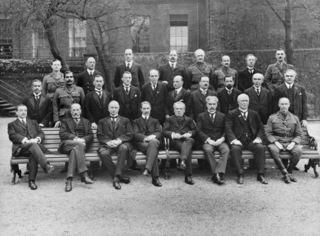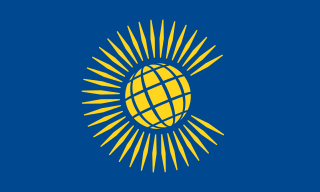The Commonwealth Heads of Government Meeting is a biennial summit meeting of the governmental leaders from all Commonwealth nations. Despite the name, the head of state may be present in the meeting instead of the head of government, especially among semi-presidential states. Every two years the meeting is held in a different member state and is chaired by that nation's respective prime minister or president, who becomes the Commonwealth Chair-in-Office until the next meeting. Queen Elizabeth II, who was the Head of the Commonwealth, attended every CHOGM beginning with Ottawa in 1973 until Perth in 2011, although her formal participation only began in 1997. She was represented by the Prince of Wales at the 2013 meeting as the 87-year-old monarch was curtailing long-distance travel. The Queen attended the 2015 summit in Malta and the 2018 summit in London, but was represented again by the Prince of Wales at the 2022 meeting in Rwanda.

Rhodesia's Unilateral Declaration of Independence (UDI) was a statement adopted by the Cabinet of Rhodesia on 11 November 1965, announcing that Southern Rhodesia or simply Rhodesia, a British territory in southern Africa that had governed itself since 1923, now regarded itself as an independent sovereign state. The culmination of a protracted dispute between the British and Rhodesian governments regarding the terms under which the latter could become fully independent, it was the first unilateral break from the United Kingdom by one of its colonies since the United States Declaration of Independence in 1776. The UK, the Commonwealth and the United Nations all deemed Rhodesia's UDI illegal, and economic sanctions, the first in the UN's history, were imposed on the breakaway colony. Amid near-complete international isolation, Rhodesia continued as an unrecognised state with the assistance of South Africa and Portugal.

The Imperial War Cabinet (IWC) was the British Empire's wartime coordinating body. It met over three sessions, the first from 20 March to 2 May 1917, the second from 11 June to late July 1918, and the third from 20 or 25 November 1918 to early January 1919. Consisting of representatives from Canada, Australia, India, the Dominion of Newfoundland, New Zealand, South Africa, and the United Kingdom, the Cabinet considered many aspects of waging the First World War. It led to the United Kingdom's Dominions being considered more equal to Great Britain and Ireland. Held concurrently with the cabinet were the Imperial War Conferences of 1917 and 1918.
The Anti-Apartheid Movement (AAM) was a British organisation that was at the centre of the international movement opposing the South African apartheid system and supporting South Africa's non-White population who were persecuted by the policies of apartheid. The AAM changed its name to ACTSA: Action for Southern Africa in 1994, when South Africa achieved majority rule through free and fair elections, in which all races could vote.

Australia and the United States are close allies, maintaining a robust relationship underpinned by shared democratic values, common interests, and cultural affinities. Economic, academic, and people-to-people ties are vibrant and strong. At the governmental level, relations between Australia and the United States are formalized by the ANZUS security agreement, the AUKUS security partnership and the Australia–United States Free Trade Agreement. They were formally allied together in both World War I, World War II, the Korean War, the Vietnam War, the Gulf War, and the War on Terror, although they had disagreements at the Paris Peace Conference. Australia is a Major non-NATO ally of the United States.
The 1971 Commonwealth Heads of Government Meeting, officially known as the I Commonwealth Heads Meeting, and commonly known as Singapore 1971, was the first Meeting of the Heads of Government of the Commonwealth of Nations. It was held from 14 to 22 January 1971 in Singapore, and was hosted by that country's Prime Minister, Lee Kuan Yew.
During the 1960s, many independence movements emerged in countries near Rhodesia, which had significant effects on political affairs and social conditions within Rhodesia.

Zimbabwe and the Commonwealth of Nations have had a controversial and stormy diplomatic relationship. Zimbabwe is a former member of the Commonwealth, having withdrawn in 2003, and the issue of Zimbabwe has repeatedly taken centre stage in the Commonwealth, both since Zimbabwe's independence and as part of the British Empire.

The Commonwealth of Nations, often simply referred to as the Commonwealth, is an international association of 56 member states, the vast majority of which are former territories of the British Empire from which it developed. The chief institutions of the organisation are the Commonwealth Secretariat, which focuses on intergovernmental aspects, and the Commonwealth Foundation, which focuses on non-governmental relations among member states. Numerous organisations are associated with and operate within the Commonwealth.
The 1973 Commonwealth Heads of Government Meeting, officially known as the II Commonwealth Heads Meeting, and commonly known as Ottawa 1973, was the second Meeting of the Heads of Government of the Commonwealth of Nations. It was held from 2 to 10 August 1973 in Ottawa, and hosted by Prime Minister Pierre Trudeau.

The 2011 Commonwealth Heads of Government Meeting, commonly known as CHOGM 2011, was the 22nd Meeting of the Heads of Government of the Commonwealth of Nations. Held in Perth, Western Australia, between 28 and 30 October 2011 and hosted by the Prime Minister Julia Gillard.
The 1975 Commonwealth Heads of Government Meeting, officially known as the III Commonwealth Heads Meeting, and commonly known as Kingston 1975, was the third Meeting of the Heads of Government of the Commonwealth of Nations. It was held from 29 April to 6 May 1975 in Kingston, Jamaica, and was hosted by that country's Prime Minister, Michael Manley.

The Rhodesian mission in Lisbon, the capital of Portugal, operated from September 1965 to May 1975. It was a diplomatic mission representing Rhodesia, initially as a self-governing colony of Britain and, after the Unilateral Declaration of Independence in November 1965, as an unrecognised state. Rhodesia informed Britain of its intent to open a Lisbon mission headed by an accredited representative, independent from the British Embassy in the city, in June 1965. Whitehall refused to endorse the idea but Rhodesia continued nonetheless, and later that month appointed Harry Reedman to head the mission. The British government attempted unsuccessfully to block this unilateral act—Rhodesia's first—for some months afterwards.
The 1961 Commonwealth Prime Ministers' Conference was the 11th Meeting of the Heads of Government of the Commonwealth of Nations. It was held in the United Kingdom in March 1961, and was hosted by that country's Prime Minister, Harold Macmillan.
The 1969 Commonwealth Prime Ministers' Conference was the 17th Meeting of the Heads of Government of the Commonwealth of Nations. It was held in the United Kingdom in January 1969, and was hosted by that country's Prime Minister, Harold Wilson.
The 1957 Commonwealth Prime Ministers' Conference was the ninth Meeting of the Heads of Government of the Commonwealth of Nations. It was held in the United Kingdom in June 1957, and was hosted by that country's Prime Minister, Harold Macmillan.

The 1960 Commonwealth Prime Ministers' Conference was the tenth Meeting of the Heads of Government of the Commonwealth of Nations. It was held in the United Kingdom in May 1960, and was hosted by that country's Prime Minister, Harold Macmillan.
The 1956 Commonwealth Prime Ministers' Conference was the eighth Meeting of the Heads of Government of the Commonwealth of Nations. It was held in the United Kingdom in June 1956, and was hosted by that country's Prime Minister, Sir Anthony Eden.
The 1964 Commonwealth Prime Ministers' Conference was the 13th Meeting of the Heads of Government of the Commonwealth of Nations. It was held in the United Kingdom in July 1964, and was hosted by the UK's Prime Minister, Sir Alec Douglas-Home.
The September 1966 Commonwealth Prime Ministers' Conference was the 16th Meeting of the Heads of Government of the Commonwealth of Nations. It was held in the United Kingdom and was hosted by that country's Prime Minister, Harold Wilson.







